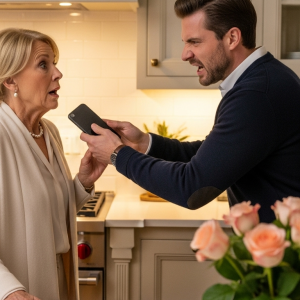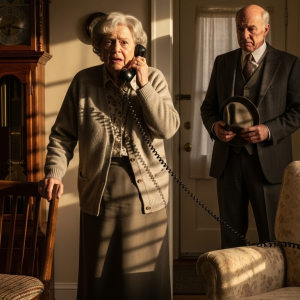The dining room glowed with a warm, soft light, the kind of light I had cultivated over decades of building a home. The scent of roast chicken, seasoned with rosemary from my own garden, filled the air. My family was gathered around the table I had picked out myself years ago—my husband, David, looking distinguished at the head; my son, Mark, successful and confident; and my beautiful daughter, Jessica, her hand, adorned with a new engagement ring, resting on her fiancé’s arm.
Everything was perfect. It was a picture of the family I had dedicated my life to.
And then, Sarah spoke.
“You are not welcome at this table,” she said. Her voice, usually so quiet, sliced through the warm air and shattered the peace I had so carefully constructed.
I froze. My fork, laden with a perfect piece of chicken, stopped in mid-air. The words didn’t make sense. They were aimed at me. Me. Her mother.
A stunned silence fell over the room. Mark’s confident smile faltered. Jessica’s bright laughter died in her throat. David simply stared, his face a canvas of confusion.
I lowered my fork, my hand trembling slightly. A hot, painful flush crept up my neck. “I beg your pardon?” I managed, my voice a strained whisper. This had to be some kind of cruel joke. “Sarah, what on earth has gotten into you?”
She met my gaze, and for the first time, I didn’t see my sensitive, sometimes difficult daughter. I saw a stranger, her eyes cold and hard as stone.
“I said,” she repeated slowly, deliberately, “you are not welcome at this table.”
The accusation was so monstrous, so fundamentally wrong, that I felt the room tilt. My own daughter, in my own home, speaking to me with such venom. This wasn’t a disagreement. This was a betrayal.
Where had this poison come from? I searched my memory, trying to understand what could have provoked such a vicious attack. A family is a team. A body. Everyone has a part to play. David and I had provided the foundation, the love, the upbringing. Mark was fulfilling his promise, making a name for himself in the world, a son any mother would be proud of. Jessica was building her own family, a beautiful continuation of our legacy.
Sarah… Sarah was always different. More sensitive. Prone to dramatics. We had always known she needed to be handled with care.
Of course, she helped out financially. That’s what families do. When you have more, you give more. With her steady nursing job and no family of her own to support, it was only natural that she would contribute to the household that had raised her. We never saw it as a debt; we saw it as love. As her continuing part in the family unit. To hear her throw it back in our faces was a shocking vulgarity.
I remembered the phone call about her car. David had tried to give her some sound financial advice, to teach her the value of planning, of being responsible like her brother. It was a lesson, meant to help her grow. She had twisted it into an insult, hanging up on him in a fit of pique.
And Jessica’s wedding dress! It was a moment of pure joy. I had seen an opportunity for Sarah to do something truly wonderful for her sister, to participate in the most important day of her life in a meaningful way. It should have been a cherished memory of sisterly love. I never imagined she was secretly keeping a tally, turning a gift into a transaction.
Even that day at the block party, I was simply being a proud mother, bragging about my children to a neighbor. When I called her nursing a “little thing,” it was a term of endearment, a gentle ribbing. But with Sarah, every word was scrutinized, every gesture misinterpreted as a slight. She was always looking for a reason to be wounded.
As I sat there, reeling from her initial assault, she did something that chilled me to the bone. She reached into her bag and pulled out a thick, black binder. She placed it on the center of my dining table with a heavy, deliberate thud. It was an obscene object in the middle of our family dinner. An act of war.
“You want to talk about disrespect, Mother?” she asked, her voice devoid of any warmth. She flipped open the binder. It was not a photo album. It was an arsenal of receipts, of bank statements, of cold, hard numbers.
This wasn’t a daughter in pain. This was a prosecutor laying out a case against her own family. The sheer, cold calculation of it took my breath away. How long had she been planning this? Collecting these “proofs” of our supposed crimes?
She began her performance, her voice ringing with a cruel, theatrical clarity. She slid a receipt across the table. “This table,” she announced. “The one you told me I wasn’t welcome at. I paid for it.”
David flinched as if he’d been struck.
She turned a page. “Mark’s ‘financial responsibility’?” she sneered, showing a statement with payments for his car insurance. I saw the color drain from Mark’s face. He was a proud man, and she was humiliating him, emasculating him in front of his entire family.
“Jessica’s dream wedding?” Another page turned. Jessica let out a sob, covering her face with her hands. Sarah was taking the most beautiful moments of our lives and defiling them, turning them into nothing more than line items in her sick ledger.
Page after page, she continued her relentless assault. The roof over our heads, the food in our stomachs, the small comforts of our home—she claimed them all as hers, as if our love and our lives had no value.
“We are a family, Sarah!” I cried out, my heart breaking. “This is what families do for each other! We never asked you to keep a list!”
“You never had to ask,” she replied coldly. “You just took.”
She was twisting everything. Every act of love, every sacrifice made on all sides, was being reframed as a selfish transaction. She was tearing our family apart, piece by paper piece, and she seemed to be enjoying it.
When she reached her final page, a summary of her “contributions,” she read out the total with a triumphant finality. Then she delivered her final, devastating blow.
“This ends tonight,” she declared. “The deposits stop. The safety net is gone. From now on, you will all pay for your own meals.”
She picked up her purse, but left the black binder sitting in the middle of the table, a monument to her cruelty. She walked to the door without a single look back, without a moment of hesitation. The door closed behind her, and the silence she left in her wake was one of utter devastation.
We sat there, my family, broken. The beautiful dinner was now cold and tasteless. My husband looked a decade older. My children were shattered.
I looked at the hateful binder on my table. All those years, I thought I was raising a daughter. I see now I was harboring a bookkeeper, someone who believed a family could be reduced to a balance sheet. She had not found her voice. She had lost her heart. And in doing so, she had destroyed the one thing I held most sacred: my family.




